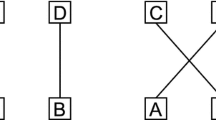Abstract
Elsewhere I have suggested that the B-theory includes a notion of passage, by virtue of including succession. Here, I provide further support for that claim by showing that uncontroversial elements of the B-theory straightforwardly ground a veridical sense of passage. First, I argue that the B-theory predicts that subjects of experience have a sense of passivity with respect to time that they do not have with respect to space, which they are right to have, even according to the B-theory. I then ask what else might be involved in our experience of time as passing that is not yet vindicated by the B-theoretic conception. I examine a recent B-theoretic explanation of our ‘illusory’ sense of passage, by Robin Le Poidevin, and argue that it explains away too much: our perception of succession poses no more of a problem on the B-theory than it does on other theories of time. Finally, I respond to an objection by Oreste Fiocco that a causal account of our sense of passage cannot succeed, because it leaves out the ‘phenomenological novelty’ of each moment.
Similar content being viewed by others
Notes
See Le Poidevin (2007, p. 85) for a B-theoretic explanation of our temporally limited perceptual horizon.
Thanks to an anonymous referee for voicing this objection.
(Mellor 1998).
(Falk 2003).
I discuss these in (Deng 2010).
In fact, that discussion barely licenses the conclusion that we project presentness onto the world, if that is understood as the claim that our perception of events as present involves some widespread error. I argue for this claim in ‘On explaining why time seems to pass’ (manuscript), where I also examine Laurie Paul’s (2010) and Simon Prosser’s (2013) proposals.
See (Phillips 2009) for references to related empirical findings.
Thus, Shaun Gallagher writes: “[T]he specious present […] is always conceived in this Jamesian tradition as a sensed or “perceived” duration that purportedly operates as a solution to what we have called “the problem of objective synthesis”. That is, it addresses the problem of explaining how we can perceive objects as either changing or persisting over time, despite the fact that the past seems not to persist or have actuality.” (1998, p. 18)
I am indebted to Oliver Pooley for this example.
(Deng 2013).
References
Dainton, B. (2000). Stream of Consciousness: Unity and continuity in conscious experience. London: Routledge.
Deng, N. (2010). Beyond A- and B-time Reconsidered. Philosophia, 38(4), 741–753.
Deng, N. (2013). Fine’s McTaggart, temporal passage, and the A versus B-debate. Ratio, 26(1), 19–34.
Falk, A. (2003). Time plus the Whoosh and Whiz. In A. Jokic & Q. Smith (Eds.), Time, tense, and reference. Cambridge: Massachusetts Institute of Technology.
Fiocco, O. (2007). Passage, becoming and the nature of temporal reality. Philosophia, 35(1), 1–21.
Gallagher, S. (1998). The inordinance of time. Evanston, Illinois: Northwestern University Press.
Le Poidevin, R. (2007). The images of time: An essay on temporal representation. Oxford: Oxford University Press.
Le Poidevin, R., & Mellor, D. H. (1987). Time, change, and the ‘indexical fallacy’. Mind, 96(384), 534–538.
Lowe, E. J. (1987a). The indexical fallacy in McTaggart’s proof of the unreality of time. Mind, 96(381), 62–70.
Lowe, E. J. (1987b). Reply to Le Poidevin and Mellor. Mind, 96(384), 539–542.
Mellor, D. H. (1998). Real time II. London: Routledge.
Oaklander, N., & Smith, Q. (Eds.). (1994). The new theory of time. New Haven: Yale University Press.
Paul, L. (2010). Temporal Experience. Journal of Philosophy, 107(7), 333–359.
Phillips, I. (2009). Review of Robin Le Poidevin’s ‘the images of time’. British Journal for the Philosophy of Science, 60(2), 439–446.
Prosser, S. (2013). Passage and perception. Noûs, 47(1), 69–84.
Acknowledgments
Thanks to Oliver Pooley for extensive discussion of these issues. Thanks also to Antony Eagle and Robin Le Poidevin for their comments. Part of this work was carried out while I was a member of the Swiss National Science Foundation project “Intentionality as the Mark of the Mental–Metaphysical Perspectives on Contemporary Philosophy of Mind” (Sinergia, CRSI11-127488).
Author information
Authors and Affiliations
Corresponding author
Rights and permissions
About this article
Cite this article
Deng, N. Our Experience of Passage on the B-Theory. Erkenn 78, 713–726 (2013). https://doi.org/10.1007/s10670-013-9489-5
Received:
Accepted:
Published:
Issue Date:
DOI: https://doi.org/10.1007/s10670-013-9489-5




